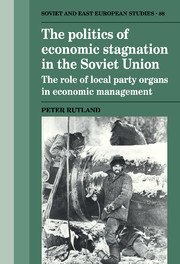 The Politics of Economic Stagnation in the Soviet Union
The Politics of Economic Stagnation in the Soviet Union Published online by Cambridge University Press: 06 July 2010
This chapter presents the results of a study of the career backgrounds of obkom first secretaries in the 1976–88 period. The primary goal was to look for evidence of the conflict between political and economic ways of thinking. J. Hough pioneered the use of career biographies as a source for the study of political change in regional party elites. Did the trends which Hough identified carry through to the mid-1980s? Did the qualifications of new entrants to the apparatus in the late Brezhnev era differ from those of their predecessors?
The opening section examines the pattern of career paths into the obkom first secretary position and the degree of geographical mobility they displayed. The second section looks at the evidence for generational turnover in the 1980s (an issue central to Hough's argument). The final section examines whether the technical qualifications of regional party leaders improved over time, as Hough suggested – the implication being that this made them better able to play the role as coordinator of their region's economy.
Before presenting the results, three caveats are in order with respect to the biographical approach. First, the argument in this book is based on an analysis of how structures worked, rather than a study of the characteristics of agents within those structures. This emphasis is partly because of the dearth of information about individual behaviour within the policy process. However, it is also because of a conviction that within the deeply entrenched bureaucratic culture of the USSR political institutions shaped and determined the behaviour of the individuals who staffed them.
To save this book to your Kindle, first ensure no-reply@cambridge.org is added to your Approved Personal Document E-mail List under your Personal Document Settings on the Manage Your Content and Devices page of your Amazon account. Then enter the ‘name’ part of your Kindle email address below. Find out more about saving to your Kindle.
Note you can select to save to either the @free.kindle.com or @kindle.com variations. ‘@free.kindle.com’ emails are free but can only be saved to your device when it is connected to wi-fi. ‘@kindle.com’ emails can be delivered even when you are not connected to wi-fi, but note that service fees apply.
Find out more about the Kindle Personal Document Service.
To save content items to your account, please confirm that you agree to abide by our usage policies. If this is the first time you use this feature, you will be asked to authorise Cambridge Core to connect with your account. Find out more about saving content to Dropbox.
To save content items to your account, please confirm that you agree to abide by our usage policies. If this is the first time you use this feature, you will be asked to authorise Cambridge Core to connect with your account. Find out more about saving content to Google Drive.